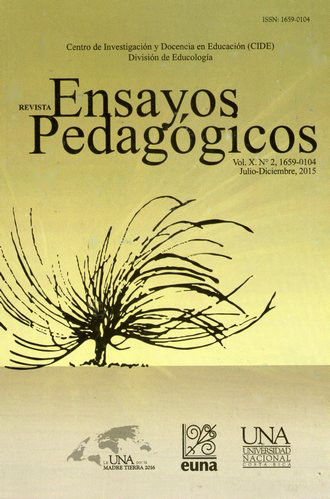Contributions to a Literature Review about the Theory and Praxis of Educational Curriculum
DOI:
https://doi.org/10.15359/rep.10-2.8Keywords:
curriculum, curriculum model, curriculum profileAbstract
The purpose of this article is to make an approximation to a literature review of the conceptualization of the theory and praxis of the educational curriculum, either as a model or as a curricular profile because multiple lines of thought on this matter have been fostered. All this has led to the development of various theories which, taken together, are a reflection of the different existing conceptions when addressing the elements of education. In this regard, a literature review and interpretation of texts under the critical - reflective paradigm was made. It is established that from the emancipatory-theoretical approach of the curriculum and the curriculum approach based on a reflection on the practice, a kind of harmony can be deduced, in which both have as a binding element a dialectic between theory and practice.
References
Álvarez, C. (2001). El Diseño Curricular. La Habana: Pueblo y Educación.
Álvarez, J. (1987). Dos perspectivas contrapuestas sobre el currículum y su desarrollo. Revista de Educación, 8 (282), 131-151.
Beauchamp, G. (2006). Currículum Theory. Michigan: University of Michigan.
Bolívar, A. (2005). El conocimiento de la enseñanza. Madrid: Morata
Bolívar, A. (2008). Didáctica y currículum: de la modernidad a la postmodernidad. Archidona: Aljibe.
De Alba, A. (2007). Currículum: crisis, mito y perspectivas. Madrid: M y Dávila.
Delors, J. (2001). Saludo al Forum Europeo de Administradores de la Educación. Oviedo: A. Príncipe Felipe.
Gallart, M. y Jacinto, C. (2007). Competencias Laborales. Revista Educación Técnico y Profesional, 2 (4), 15-23.
García, M. (1998). Diseño, desarrollo e innovación del currículum. Córdoba: Servicio de Publicaciones de la Universidad de Córdoba.
Gimeno, J. (1983). Teoría Del currículum. En Diccionario de las Ciencias de la Educación. Santillana. Madrid, España. Tomo I: Pp. 341-373.
Gimeno, J. (2002). El currículum una reflexión sobre la práctica. Madrid: Morata.
Gimeno, J. (2005). Comprender y transformar la enseñanza. Madrid: Morata.
González, M. y Escudero, J. (1987). Innovación educativa: teoría y procesos de desarrollo. Barcelona: Humanitas.
Grundy, S. (2010). Producto o praxis del currículum. Madrid: Morata.
Guarro, A. (1999). Modelos de diseño de corte técnico y experto: descripción y balance crítico. En Escudero, J. (Ed.). Diseño, desarrollo e innovación del currículum. Síntesis. Madrid, España. Pp. 99-122.
Habermas, J. (2002). Knowledge and human interests. London: Heinemann.
Habermas, J. (2004). Theory and practice. London: Heinemann.
Habermas, J. (2009). Teoría de la acción comunicativa. Madrid: Altea, Taurus.
Kemmis, S. (2008). El currículum: más allá de la teoría de la reproducción. Madrid: Morata.
Lundgren, U. (2012). Teoría del curriculum y escolarización. Madrid: Morata.
Moreno, J. (1999). Modelos de corte deliberativo y práctico: descripción y balance. En Escudero, J. (Ed.). Diseño, desarrollo e innovación del currículum. Síntesis. Madrid, España. Pp. 123-144.
Salinas, D. (1994). La planificación de la enseñanza: ¿Técnica, sentido común o saber profesional? En Angulo, J. y Blanco, N. (Coords.) Teoría y desarrollo del currículum. Aljibe. Málaga, España. Pp. 72-89.
Stenhouse, L. (2012). Investigación y desarrollo del currículum. Madrid: Morata.
Tejada, J. (2005). Didáctica-Currículum. Diseño, desarrollo y evaluación curricular. Barcelona: Davinci Continental, S.L.
Walker, D. (2003). Fundamentals of curriculum: Passion and professionalism. Mahwah, N. J.: L. Erlbaum Associates.
Downloads
Published
How to Cite
Issue
Section
License
Ensayos Pedagógicos is subscribed to the Attribution-NonCommertial-NoDerivatives 4.0 International Creative Commons Licence, which allows both authors and readers to freely download, store, copy, and distribute the final approved publisehd version of the manuscript (post-print) as long as this is done without commercial purposes, no derivative works are generated, and the source and author are mentioned. As well, Ensayos Pedagógicos declares that authors will remain the rightful owners of the copyrights of their work in perpetuity.







